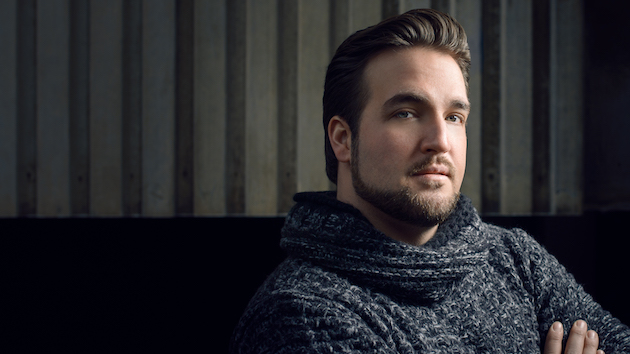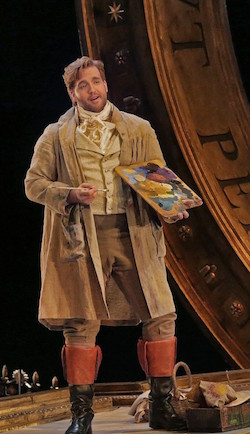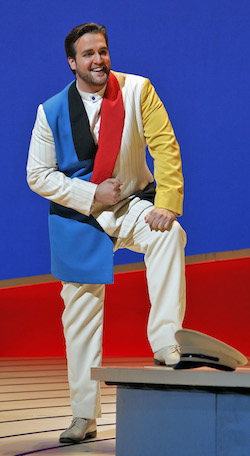
The demands of the modern operatic career are many. Short rehearsal periods mean more travel, changing directorial styles mean greater theatrical demands, and the rise of televised and video performances add an increased pressure to look good on screen. It’s a tough life, and hard to imagine anyone better suited to it than the congenial, handsome, and stentorian-voiced tenor Brian Jagde. Since winning the Operalia competition’s Birgit Nilsson Prize in 2012 and second prize at the age of 32, the Long Island native has taken long strides across the operatic landscape with debuts at the Metropolitan Opera, Lyric Opera of Chicago, and the Royal Opera House Covent Garden. He celebrated his marriage last year and has another love in his life who accompanies him everywhere, a long-eared spaniel mix named, appropriately, Cavaradossi.
Jagde — pronounced jade, or if you want to honor his 90-percent German heritage, ‘Yahk-teh’ from Jäger, meaning hunter — busy as he is, takes time to speak and act passionately on behalf of music education in the schools, recently joining the advisory board of Time in Kids, in New York City, and works in his ‘off’ hours to arrange performances in schools, and create other ventures to broaden audience access to opera. He has even put a personal touch on the opening night tradition of gifts of candy, giving instead donations to arts programs. Jagde completed his training in San Francisco in the Merola program after which he was chosen as an Adler Fellow, and awarded the rare honor of a third year in that fellowship. Since then he has returned to San Francisco to give commanding performances as Pinkerton in Madama Butterfly, Don Jose in Carmen, and Cavaradossi in Tosca, a role he has also performed in Santa Fe and at the Deutsche Oper Berlin. San Franciscans now await his interpretation of one of the most demanding Italian tenor heroes, Radames in Verdi’s Aida. On a recent day with five hours of rehearsal scheduled, Jagde admitted to battling a cold, but seemed in fine spirits when he sat down in the opera pressroom for our chat. Jagde began by talking about the scene he was due to rehearse next.
I think Verdi wrote it always spacing between scenes so you could rest, but in this production they’ve decided to show the audience the torture and judgment scene. It’s mostly just the idea of torture is, because they’re using these ribbons, something very similar to the décor in that act. It’s going to be very beautiful. I’m onstage while all the Sacerdoti and other priests are judging me, which is usually just sung offstage and you imagine he doesn’t answer them.
Kind of like Cavaradossi, you’re used to being tortured offstage.

Typically, it’s very similar to that. In fact I had to be onstage, sort of, during one [Tosca] I did in Chicago Lyric. It’s the same production that’s done in Houston now. It had these boxes of the spoils Scarpia had stolen, all the fine art from the area, so I was being tortured in a box onstage, changing out of costume into another costume, and singing. This is the only little challenge in this staging that’s different, because I won’t be offstage warming up and doing little things, but I only have one scene after that and it’s the scene where Aida dies, and presumably I die after that at some point.
Spoiler alert.
Well, you never see it.
Do I have this right: After ten years of singing as a baritone, you suspected you might be a tenor, went to a new teacher, and five weeks later you were accepted into Merola as a tenor? That’s a lightening-quick transition. What arias did you sing for the audition?
Within two weeks of switching to my new teacher, I had a manager — a good starter manager — I was auditioning for leading roles in small, regional houses. I didn’t get any of those jobs. I wasn’t really ready, but it was good to be out there singing this repertoire. I always refer to it like a bull in a china shop at that time because I had no finesse. I could just sort of sit in that tessitura and people were like, ‘oh, that’s more correct than before.’ In fact, when I had auditioned for Merola once, as a baritone, I think it was 2006, Mark Morash has told me, he wrote on the application ‘come back when you’re a tenor.’
But the truth is many people had been saying it to me for years. A famous tenor said to me recently, ‘we are survivors of our teachers.’ And it’s so true. At 20 when I started to train as an opera singer, I didn’t even know what that meant. I didn’t even want to be an opera singer. They just taught me the basic principles that in a certain way made me force a certain color that was darker, so they said, ‘maybe you’re a baritone.’ This happens a lot.
All along that time I never had any real low notes. I always had high notes. I had a year away from them, I was working as a young artist at Virginia Opera, and I had a role in New Jersey Opera, and I thought, ‘maybe there’s something to this. I’m warming up to High C, I still have no low A flat, something’s wrong.’ Some people gave me some advice, they recommended two teachers, and I chose the one closest to me in New York City, Michael Paul. I walked into my first lesson and said, ‘I’m here to find out if I’m a tenor,’ and he said, ‘You’re a tenor.’ In fact, he said he would only work with me if I switched to tenor, ‘because I wouldn’t be serving you any if I kept you a baritone. You’ll never have the kind of career you can have as a tenor.’ This was audition season. September [2008].
Two weeks later I was doing those auditions. Three weeks, four weeks, young artist auditions, and Merola was the fifth week. They require a Mozart, so I had the Magic Flute aria [“Dies Bildnis”], I had Carmen, I think I might have had a Tosca aria on there, and I had a third act aria from Manon Lescaut [laughs]. Because they were kind of power arias like, “E lucevan,” something I could stay as heavy as I was vocally at the time, I could just go at them. I really didn’t expect to get into any of these things, but I guess they saw something in me.
They didn’t ask for the Mozart, but they asked me in the callback interview, because they do an interview with everybody probably to see if your temperament is right for the program, if you’re interested in really learning, because there’s 13 different weeks with all these different coaches, it’s very complicated for singers, so they asked me, ‘If we had asked for the Mozart how would that have gone?’ And I said, ‘It would’ve been like a bull in a china shop, but I could have done it. But thank you for not asking for it!’ Long story short, they got me in Merola, and I got chosen as an Adler, which was a total surprise. By then I was really getting deep into learning to be a tenor, I was starting to sing my first roles in regional companies, in Europe even, and here we are, six years after singing the Messenger in Aida, I’m singing Radames here. It’s the biggest undertaking of my career thus far, role-wise. It’s the longest role. It’s the most challenging role. It’s fun.
As a winner of the Birgit Nilsson Prize, what is your current thinking on progressing into the heaviest tenor roles? You’ve said you’re ready for Hoffmann now, is that role on the books yet?
No. I covered it here.
OK world, he’s ready for Hoffmann. Will there be a day for Siegfried? Or Siegmund?
It’s a good question. I’m trying to keep those as far in the distance as possible. I love that competition [Operalia] and I had done it two years earlier, and had seen that most of the singers our age weren’t singing Wagner. Strauss maybe, but not Wagner, so I learned that aria just to have a chance to win some extra cash, because there’s not a lot of competition in that field on that version of the competition. A lot of people have seen that since, and people have started adding Strauss arias, and somewhat Wagnerian arias. It’s smart. I was just playing the competition game. But in reality I could sing Siegmund now. And Siegfried, of course, eventually I could sing that. It’s just a matter of do I really want to go there and how fast do I want to go there?
And Parsifal, or Lohengrin?
Yeah. I’m already getting asked for Lohengrins and I say no all the time. I could take a Lohengrin, but there’s sort of a stigma here in this country, that singers who typically go towards that kind of repertoire get pigeonholed once you’re there, and while that’s a good thing, I want to preserve the youth of my voice as long as I can. I want to have a long career. I said no to two Meistersingers in the last year. All kinds of stuff. I said no to a Fanciulla del West at one of the biggest opera houses in the world. I didn’t make my debut at that house because they offered me a role I wasn’t ready for. I’m ready for it within five years, but I know that, so I’m not going to push myself that hard.
This kind of challenge I’m ready for. I’m ready to start working on Aida and what I mean by that is, this is my first Aida. So, hopefully it’ll keep getting better. That’s my goal. Even per night in the run of the show, to fix one or two things from the previous show, so I can keep improving within that run, and then hopefully the next time I come back to the role, it’ll be that much better. It’s always about what am I capable of doing now? And where do I see that role development going, and where do I see my career development going? And I like to go slow and steady because I really do believe it wins the race. I’ll add Trovatore in the future, too, but that’s probably two years out.
That’s what Birgit Nilsson told soprano Christine Brewer, ‘Sing Donna Anna as long as you can.’
It’s true. Somebody asked me, ‘Why are you singing more Butterflies?’ and I said because I can do Butterflies for the rest of my career. I will never be tired of Butterfly. I can come in and sing it without as much effort. You have to space the seasons out. Especially nowadays when singers are working probably two or three more productions a year with everything costing twice or three times as much, because the fees haven’t really changed in this business. So we’re all working that much more without having as much time to prepare a role in between, and not getting the time with conductors like old singers used to have before a gig. So you have to have a slow enough pacing that you don’t burn out. You see people burn out all the time.
I loved your Pinkerton. It was very hard to despise you.

Thank you. Puccini, in the first version includes all that monkey talk from the play, ‘they’re no better than trained monkeys,’ and the aria didn’t exist in the third act. Of course the tenor demanded that — and thank God he did — because it at least gives a chance for the tenor to show some remorse. And obviously Puccini thought that it would probably make it a harder fall if everybody suspects that he may stay. Of course now we all know the story, but I always try to think she (Butterfly) is way cooler than I thought. As if I thought this was going to be like every other guy on a ship who finds some girl and ‘marries’ her so they can fool around and then goes back to war. I always try to play that duet like there’s more to this. Yeah, he’s sexually energized and really wants to get to bed, but she’s telling him that she gave up her religion and joined his religion in secret. It’s hard not to fall for someone who’s so beautiful and so committed. I always think if there’s a question if his mind, at least the audience may think that there’s a question of whether he leaves and doesn’t come back. And then he does call her name at the end.
You studied computer science before deciding to study singing.
I had a pretty voice, but nothing special. Nobody was going, like, ‘You’re a wunderkind! You’re going to be a great singer in opera!’ I was just some kid who could carry a tune. And one of my grandfathers, who is unfortunately passed away now, said, ‘It’s not a very lucrative career.’ So I thought, I’ll just go into business science and sing in choruses, and I did that in college at SUNY Albany, and two years later, I hated typing code, and I was really bad at it. I was just really bad at C++. Typing hundreds of lines of code just to make a screen say 4 + 4, line, = 8 just made me nuts. Literally crazy. And sitting in a cubicle, and those lights. All I got joy from was singing in the madrigal group at the college, and singing in the master chorus there.
I heard that SUNY Purchase had a new version of its long-standing singing program, and I said, Oh! Interesting. I’m going to audition for this one school, and if I don’t get in, I’ll stay here and just finish out my days [Laughs]. I got waitlisted. I had to call them to find out I was waitlisted, and they said, ‘You were waitlisted, but hang on ... OK you’re in.’ But I had to start over as a freshman again. I didn’t want to sing opera. I just thought classical singing was a training. I didn’t know it had anything to do with opera. That season, I went in as a tenor and they switched me to baritone halfway into the year because of the way they were manipulating my voice, telling me things like ‘Lower your larynx.’ They never talked about the body. I was in pain after lessons. You just don’t know and you think to yourself, ‘That’s how it’s supposed to be, because that’s what the teacher says.’
How fragile is your ego? Do you read your reviews?
I typically wouldn’t really care what reviewers say. There are five reviewers in the audience and a thousand people who are not writing reviews who typically seem pretty happy. So I try my best to make them happy, but really, I’m not focused on that. You start focusing on the wrong things when you’re onstage. ‘Oh, I have to sing this soft because they think I should sing this soft.’ I had to come to this conclusion after the summer, because the summer was one of the harder reviews for the Carmen for me, that I’ve ever gotten, and in the long run I had to realize, that’s their opinion, that’s fine. The way that people write reviews today — I’ve been talking with some people about this — and it is a little different. There’s this conversation of ‘should we hold people to a high standard,’ and I say of course we should, but sometimes when it gets too literal, like come scritto [as written] in the score, and if that person doesn’t do that, then automatically something’s wrong. They should be thrilled that you’re an artist who went up there and made the best choices for your voice. Luisotti and I talked about the end of the aria, [“Celeste Aida”] and I said I really want to do the diminuendo at the end and he said, ‘I don’t want you to do that. I want forte.’ And I said, ‘Maestro, but it’s written this way and I’ve been working on it.’ And he told me of a famous tenor 25 years ago who did it that way and everybody said, ‘Why did he sing that so soft?’ So, yes, you start with the score. Verdi is so specific. He wrote portamento here. But in the end, it’s always based on interpretation, the way that instrument works. I find it sometimes upsetting when I read reviews of my friends, who are good singers, who are really trying to bring the best form of their art to the public, and they’re marked down a notch because they didn’t do something written in the score by a man who wrote it 150 years ago for tenors who were singing falsetto at the time! So when someone wrote a pianissimo B-flat, the guy was like, ‘Ah!' [sings falsetto].
I want reviewers to write what they feel when they’re in the seats, and if they don’t feel something then that singer may not be doing their job to the best of their ability, or maybe that is their best. But it shouldn’t detract from people going to the opera, because that’s the last thing this business needs. And it should be with the respect that these people deserve because it’s hard work. Every moment that you spend to prepare every note that’s on that page. It takes a long time to prepare a role. I don’t think people realize that we’re not paid when we’re learning that, we’re only paid when we sing. If we don’t sing we don’t get paid. We’re working hard and very diligently because we believe it and we want to put it out there. Every artist is different. I appreciate all singers. Even the singers who are struggling, which I see.
S.F. is really a home company for you being a Merolino and three-year Adler. What was it like backstage at the Gockley Gala? Was that a night to remember forever?
That was one of the highlights of my life. I’ve been onstage with Renée Fleming here. Actually I’ve been onstage with a lot of those people who were in that concert here. But being chosen to be in an event like that, it was such an honor. And that man, David Gockley, had done so much for me. They chose the repertoire. I love that aria [“Nessun Dorma”], and I was happy to sing that aria. I’ll be doing that opera, coming to a theater near you ...
Being backstage, I’m talking to Thomas Hampson. He actually did Scarpia in Santa Fe when I was there for a few performances. And Dolora Zajick, one of the greatest voices to ever grace a stage. She inspires me, just watching her. It’s a big deal to stand backstage with her. There’s always this young singer thing where you idolize those singers who made it, and then you realize they’re just people who are trying to do their job too. I love talking to Eric Owens. He’s such a cool dude, and he has stories about every facet of the business, and I haven’t experienced some of them yet. It’s so nice to realize that we’re doing the same thing as them. Everybody’s just going out there and doing our jobs and trying to bring something good. Some people get jaded in this business. You see that sometimes with some of the singers who’ve made it, because the business has changed quite a bit in the past 25 years. You see what’s been lost, you see what’s been gained.
It was an awesome experience. I had the privilege, at the end I was standing there when David Gockley came out and said, ‘Any questions?’ in that Candide section. And Pat [Patricia Racette] had to fly in from Santa Fe and go back. It was great seeing friends like Pat. When I worked with her the first time in Tosca here, I learned so much just being around a person like that. I look forward to working with Angela Gheorghiu and [conductor] Daniel Oren in Adriana Lecouvreur in London this February and March. I just can’t wait to find out what I’m going to learn from those people who have been around longer than I have. But it’s also nice to find people you can collaborate with. There are a lot of people coming up who are my age, conductors even. And it’s exciting. Maybe we’ll have something like Mehta and Pavarotti.
I got to work with Mehta last year and it was one of the coolest experiences of my life, too. He knows how to conduct in a way that blows your mind. When you’re working with someone who you know is going to support you at every turn. They’re in that pit, you’re making music, what better feeling is there? That’s the selfish feeling for me. That’s what I get the joy from. Making something really special and you know in that moment you’re doing it. You’re feeling it. You feel really good about everything you’re producing and you’re just focused on the character choices you’re making at that moment and you’re bringing the audience to you. It’s very rare that that actually happens. It’s a once in a while thing.

